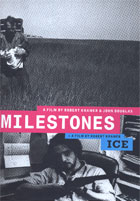
Milestones : Ice Milestones 1975; Ice 1969
Distributed by Icarus Films, 32 Court St., 21st Floor, Brooklyn, NY 11201; 800-876-1710
Milestones produced by Barbara Stone and David C. Stone; Ice produced by David C. Stone
Milestones produced by Robert Kramer & John Douglas; Ice directed by Robert Kramer
DVD, color and b&w; Milestones 199 min.; Ice 128 min.
College - General Adult
American Studies, Film Studies, Urban Studies
Date Entered: 03/14/2012
Reviewed by Jennifer Dean, MALS student, City Univerity of New York (CUNY Graduate Center)Milestones and Ice, two films by Robert Kramer (Milestones with John Douglas), available for the first time on DVD includes a comprehensive, wonderful insert describing the politics of the filmmakers and honoring Robert Kramer. Milestones follows numerous characters as they meander through the 1970’s trying to come to terms with their life post-sixties anti-war movement. The movie is as meandering as the characters it reveals and although it has moments of beauty and insight it lacks focus and fails to transcend its limitations. The piece is scripted by Kramer and Douglas, but, they use non-actors and their actual lives for the narrative. Oftentimes this leads to awkward performances and scenes where the characters pontificate without really engaging the audience or providing intellectual stimulation. The best moments in the film are the unscripted elements that reveal layers that go beyond the expository nature of most of the film. One example of this is a scene of an actual live birth, neither romanticized in the way of a fictional film nor in the least bit clinical as represented in most documentaries, the camera captures in close-up the baby’s head being pulled and forced out of the birth canal during its violent entrance into this lost world.
Kramer & Douglas take risks in the movie that often don’t pan out. They stage a sexual assault on one of the characters where a man with a gun attempts to force fellatio. The trauma is relived during a sequence where the man’s genitals are pushed up against the camera lens in an attempt to put the audience in the position of the victim. Although a unique idea the action merely succeeds in engendering absurdity not identification with a feeling of violation.
Ice isn’t quite as stilted as Milestones but similar to Milestones focuses on the perspective of the upper-middle class white male – this time trying to find a place in the revolutionary world. Ice tells the story of a fictional revolutionary group in the United States. Ironically, one of the characters jumps up on a ledge below a window in the midst of a meeting and remarks that “out here we have reality” but by standing in front of the window reality is blocked and the revolutionaries will never know “those people” out there. Similarly the film is contained within the world of these revolutionaries but fails to shed light on what the revolution is all about. The Milestones:Ice collection might be of interest for anyone specifically engaging with the role of the white middle class in the American anti-war movement or post-sixties America but its limitations prevent me from recommending even with reservations. There are many more compelling films dealing with the theme of revolution including Gillo Pontecorvo’s Battle of Algiers (1966) (which interweaves real life narratives with his fictional script as does Milestones), or Jean-Luc Godard’s La Chinoise (1967) (which also addresses the bourgeois revolutionary struggle and the contradictions inherent in it) or perhaps in Kramer’s oeuvre The People’s War (1970), a documentary on the Vietnamese struggle. Not recommended.